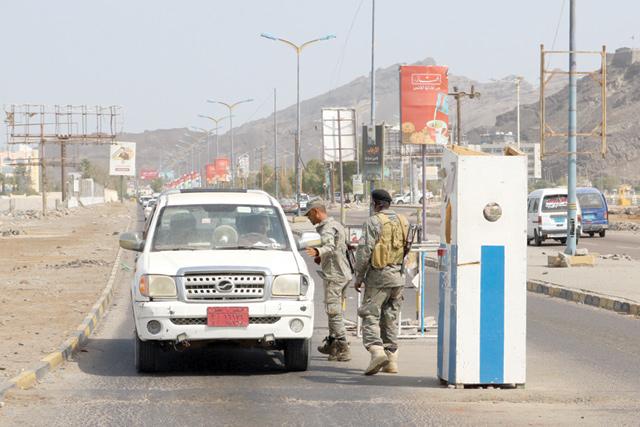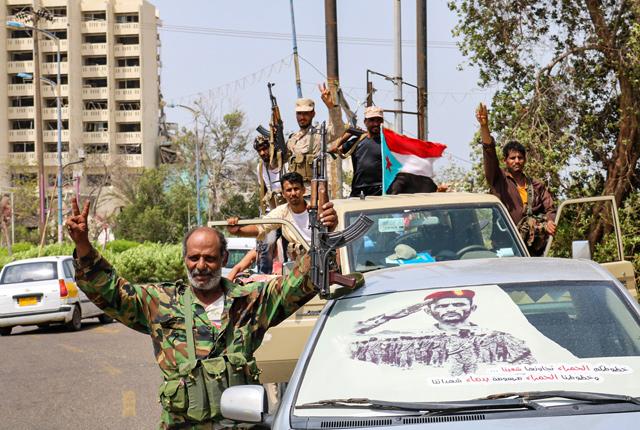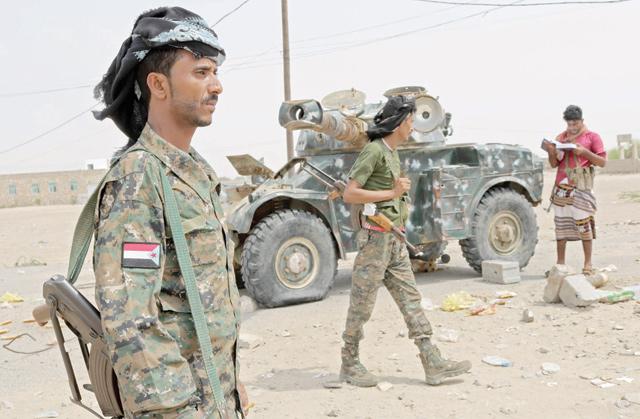You are here
Yemen separatists drive out gov't troops from two camps in south
By AFP - Aug 21,2019 - Last updated at Aug 21,2019

Fighters of the UAE-trained Security Belt forces, dominated by backers of the Southern Transitional Council which seeks independence for south Yemen, man a checkpoint in the Khor Maksar district of Yemen's second city of Aden on Sunday (AFP photo)
ADEN — Yemeni separatists drove government troops out of two military camps in deadly clashes Tuesday, reinforcing their presence in the south after they seized the de facto capital Aden.
The fighting, in Abyan province, came after the pro-independence Southern Transitional Council (STC) partially withdrew from key sites it occupied in Aden earlier this month, and a Saudi-led military coalition — which backs the government — said it had "succeeded in calming the situation".
But on Tuesday fighters from the so-called Security Belt forces initially surrounded a special forces camp in Zinjibar, the capital of Abyan about 60 kilometres from Aden — and a nearby military camp at Al Kawd, Abyan governor Abu Bakr Hussein told AFP.
He said the separatists then seized the Al-Kawd camp in fierce clashes, forcing out the 350 troops there, and that they remained positioned around the Zinjibar base following the exit of government forces in a deal mediated by local authorities.
At least four military personnel — two separatists and two government troops — were killed and 23 wounded in the fighting, said Hussein, adding that 1,100 troops had been stationed in Zinjibar.
The spike in tensions between the separatists and pro-government forces constrains their cooperation against a common foe — the Iran-aligned Houthi rebels — in a war that has pushed the country to the brink of famine.
Mohammed Al Markhi, a commander in the Security Belt Forces — an outfit trained by the United Arab Emirates that is aligned with the STC — told AFP “we are controlling both camps now.”
Residents in Zinjibar, meanwhile, said separatist troops were deployed in the capital’s streets.
Yemeni Information Minister Moammer Al Eryani said in an earlier tweet that the Zinjibar base had been besieged.
“The Security Belt Forces... are demanding the [government] troops surrender or they will storm the camp,” he said.
On August 10, the Security Belt Forces ousted loyalists of President Abed Rabbo Mansour Hadi from what was the capital of the formerly independent south in clashes that left around 40 people dead.
They agreed to a withdrawal under pressure by Saudi Arabia and the UAE — both key to the military coalition supporting the Yemeni government against the Houthis — but retain control of key military sites.
Yemen’s Deputy Foreign Minister Mohammad Al Hadhrami said the latest flare-up will undermine peace talks.
“What Abyan governorate is witnessing is an unjustified escalation by the STC,” the Yemeni foreign ministry quoted him as saying.
“It is something that is rejected and unacceptable and will undermine mediation efforts by Saudi Arabia.”
“We reject the continued provision of financial and military support by the UAE to outlawed STC forces in Yemen,” he added.
In an interview with pan-Arab daily Asharq Al Awsat, STC spokesman Nizar Haitham said the group was open to dialogue but ruled out any withdrawal from the military posts in Aden.
“There will be no dialogue if we were to hand over all the positions... what will there be left to negotiate,” he said in remarks published on Tuesday.
South Yemen was a separate state until it merged with the north in 1990.
Four years later, an armed secession bid ended in occupation by northern forces, giving rise to resentments which persist to this day.
The Saudi-led military coalition sent a delegation to Aden — the Hadi government’s base since the Houthi rebels took over Yemen’s capital Sanaa in 2014 — on Thursday to discuss the new front in the country’s crisis.
The UAE is Saudi Arabia’s main partner in the coalition fighting the Houthis, but trained and equipped the separatists.
Analysts say the break between Hadi’s internationally recognised government and the separatists reflects a wider rift between Riyadh and Abu Dhabi.
The UN’s Yemen envoy Martin Griffiths said he held a “positive and engaging” meeting with Saudi’s deputy defence minister, Prince Khaled Bin Salman, on Monday to discuss the crisis.
“Tireless role under Khaled Bin Salman’s leadership to restore order and stability in south Yemen,” he tweeted on Tuesday. “We agreed on the need for continuous dialogue.”
Related Articles
ADEN — Yemen's government Thursday accused the UAE of launching air strikes against its troops in the interim capital Aden in support of sep
ADEN — Fighting broke out on Monday between government troops and separatists in southern Yemen, officials said, in the first major clash si
DUBAI — Yemeni government troops took control Saturday of the city of Ataq, two days after deadly clashes between loyalists and southern sep



















